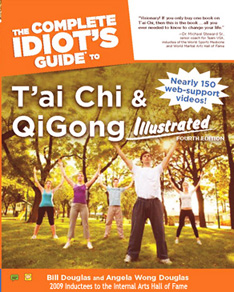Addiction Recovery.
Qigong Shows Promise in Helping to Control Withdrawal Symptoms for Cocaine Addicts
Individuals undergoing residential substance abuse treatment who received qigong therapy, compared to a similar duration of sham treatment, reported significantly reduced cravings for cocaine in response to viewing and handling items related to cocaine use. The qigong treatment group were also significantly less likely to have symptoms of depression than the sham treatment group ...
-- Massage Magazine, Feb. 25, 2013
Read entire article
at: http://www.massagemag.com/News/massage-news.php?id=13697&catid=can-qigong-reduce-cocaine-cravings-in-early-addiction-recovery&title=
Effects of tai chi on the protracted abstinence syndrome: a time trial analysis.
results suggest that Tai Chi might have a positive effect on PAS, which future studies can confirm by using an expanded sample size, longer trial time, and more sensitive and specific indicators of psychological and physiological health.
-- National Qigong Association report on PubMed research listing
Tai-Chi does much more for recovering addicts than basic exercise or meditation alone... a powerful complementary therapy for most maladies, including addiction to drugs, alcohol, sex and gambling ... research studies have shown that extensive drug use clogs the body with toxic debris which otherwise can lodge in the tissues for years. Tai-Chi’s active stimulation of the lymph system speeds up the physical recovery process, helping to remove impurities from the bloodstream. These impure toxins are some of the causes for natural unrest within the person, so by accelerating the release of these toxins through added alternative addiction treatment methods, individuals are provided a better chance to focus on recovery.
-- The Beachcomber - A Private Rehabilitation Center
http://www.thebeachcomberrehabilitation.com/how-tai-chi-helps-in-drug-addiction-recovery.html
Read WorldTaiChiDay.org commentary on Tai Chi, Qigong, and Addiction.
Research at the University of Miami School of Medicine has shown that adolescents with ADHD (Attention Deficit and Hyperactivity Disorder) displayed less anxiety, daydreaming behaviors, inappropriate emotions and hyperactivity, and greater improved conduct, after a five week, two day per week class. T'ai Chi meets many of the criteria for mood management techniques recommended for ADD (see the Treating Attention Deficit Disorder [ADD] section earlier in this chapter).
|
Click the Tai Chi figure above for a video on "How Tai Chi & Qigong
Helps with Chronic Health Issues, local PBS affiliate KCPT" on
University of Kansas Hospital Tai Chi Program & scroll down for
Harvard Lecture series on Tai Chi for chronic health issues.
Check for World Tai Chi & Qigong Day articles on various health conditions and Tai Chi & Qigong (Chi Kung) Therapy, that you may publish on your publication or website, by clicking here.
Any re-printed information from this website, MUST include a live link to http://www.worldtaichiday.org
|
* NOTE: World Tai Chi & Qigong Day advises consulting your physician before beginning any new exercise, herbal, diet, or health program. The research listed here is meant to stimulate a discussion between you and your physician, health insurance carrier, etc., not as medical advise. Research and comments provided here are hoped to stimulate a more robust discussion of powerful natural mind/body health tools. Popular media, health media, and government must increase attention to stunning emerging research, including the UCLA study indicating Tai Chi participants enjoyed a 50% increase in immune system resistance to viral infection.
|
|
|
|
TOP RATED
Tai Chi & Qigong DVD!
40% OFF!

|
|
|
Many of these health listings are provided courtesy of excerpts from
Reprinting is strictly forbidden without express written consent from the
author. To inquire for reprint permission, email: wtcqd2000@aol.com
|
|
Also, search the Qigong Institute's "Qigong and Energy Medicine Database," for research abstracts on Tai Chi & Qigong.

The Qigong and Energy Medicine Database™ is a compilation of references to a series of extensive clinical and experimental research on medical applications of Qigong carried out in China and beyond beginning about 1980. These studies as well as to reports in scientific journals, books, international conferences, and The National Library of Medicine and PubMed. The Qigong and Energy Medicine Database™ provides a record in English of the vast amount of clinical and experimental research on Qigong from China as well from other countries. Included are reports of therapies that have been tried and claimed to be effective. These reports can be used as a guide for improving health and for deciding what further research may be required to confirm promising applications of Qigong.
The Qigong & Energy Medicine Database™ contains references not only to Qigong but also to other energy-based research, therapies, clinical trials, and practices. While the emphasis is on scientific reports, reviews are provided in some cases. The Database contains abstracts (not full text). Abstracts range in length from a paragraph to several pages and may contain information on methodology, controlled experiments, results summarized in tables, and statistical analysis.
Click below to begin using the Qigong Institute's Qigong and Energy Medicine Database:
http://www.qigonginstitute.org/html/database.php
|
|
|
|







